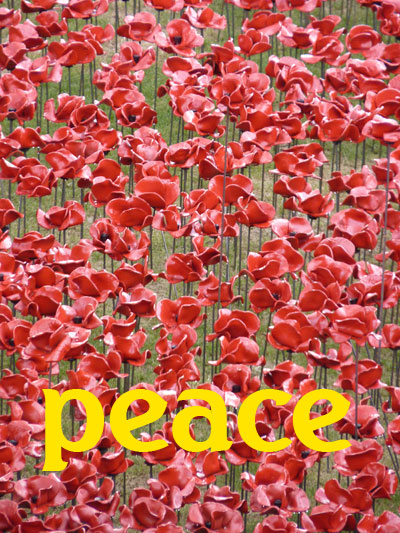Peace - the role of nationality and religion

Oddly, peace is something that we usually define by absences - absence of conflict, absence of aggression, persecution, suppression and so on.
It has been an objective for so many years - probably almost as long as mankind has been involved with conflict. One definition of world peace states that it is 'an ideal of freedom, peace, and happiness among and within all nations and / or people'. A somewhat circular, but reasonable definition.
Setting the scene
In 1899, Nicholas II, the Czar of Russia, held a conference in the Hague with the specific purpose of 'seeking the most effective means of ensuring to all peoples the benefits of a real and lasting peace'. That was, of course, followed in 1914-18 by the 'war to end all wars' - World War I, this year (2014) being the 100th anniversary of its start.
During WWI, the League of Nations was conceived and established in 1919 to 'promote international co-operation and to achieve peace and security' by the Treaty of Versailles. It stopped working after it failed to stop the Second World War.
After WWII, representatives from 50 nations drew up the United Nations Charter (followed later by Poland to make it 51 members) establishing the United Nations (UN).
Under its Charter, the UN was established: 'to maintain international peace and security, and to that end: to take effective collective measures for the prevention and removal of threats to the peace, and for the suppression of acts of aggression or other breaches of the peace, and to bring about by peaceful means, and in conformity with the principles of justice and international law, adjustment or settlement of international disputes or situations which might lead to a breach of the peace.'
The status quo
Sadly, the reality is that conflict is still with us. Some has been going for many years, some may be on the brink of starting. We continue to live in an age when people and nations fight each other on the basis of ethnicity, beliefs, religion, possession of land or natural resources, for power and dominance, and a wealth of other rationales.
The role of nationality and religion in peace was the topic of a discussion held recently at the House of Lords in London. A panel of speakers opened the discussion with short presentations and throughout there were some recurring themes, the main ones being the need for education, self-esteem amongst people and, of course, justice.
Often the causes of conflict could be summarised by the word 'greed'. Imam Abdul Quddus Arif commented that, "the nationís peace is always disrupted at a time when people hold little confidence in their democracy and the economy is on the decline". He continued to comment that, "for social peace, it is necessary for us always to keep an eye on our own resources and try and derive full benefit from them."
Two things underpin the human situation - having a meaning and purpose in life (to do and achieve something worthwhile to the greater good) and self-esteem. Without self-esteem, it is difficult to achieve, as we see from the prevalence of stress and depression in life today. Lack of self-esteem is seen to be one of the causes of the so-called 'disengaged youth' and issues that arise from the Biblical saying, "Idle hands are the devil's workshop" (Proverbs 16:27).
Bishop Paul Burton opened by talking about different types of peace - about peace on the streets from his time as a police officer in Manchester; international peace between nations; and the root of all, peace between people. Imam Abdul Quddus Arif later quoted the spiritual head of the Ahmadiyya Muslim Community, "If you have peace in you, it means that you are projecting peace" to reinforce that point.
Bishop Paul highlighted the issue that it is necessary to talk to the 'right person' and talk to them in a language they understand - which is as much an issue of the words that we use, as well as the actual language in which we speak.
The work of St Ethelburgha's Centre for Reconciliation and Peace is concerned with bringing people together and talking about things. One of the programmes highlighted by Marianne Zeck from St Ethelburgha's is concerned with 'The art of self-regulation' that moves beyond politically-correct positions and works to understand the biology of conflict and rage. This addresses the psychological issues, particularly stress, and how it induces us to use the so-called 'old brain' which makes us so reactive and aggressive.
The importance of listening was also highlighted by Jeffrey Blum who is part of the LIVE (Let's Involve the Victims' Experience) programme at the Glencree Centre for Peace and reconciliation, as well as being a shipbroker in the City of London and international lecturer in arbitration. Jeffrey also works with St Ethelburgha's and the peace centre in Warrington. He started his work in reconciliation and peace as a result of being, essentially, killed by the IRA bombing of the Baltic shipping Exchange in the City of London. Jeffrey was miraculously saved by a passing medic and, after many months in hospital, recovery and recuperation, he decided to do something constructive and proactive. He said, "I could be very angry or just get on with life". He decided that being angry for ever would achieve nothing and use a lot of energy that would be more valuably used to do something constructive and useful.
Education was a theme that permeated the presentations and Q&A. Hatred and fear is often passed from generation to generation, grandfather to father to son. If the cycle is not broken, then any change will take many generations to achieve.
Imam Quddus commented that, for peace, "The key is absolute justice and fairness in all matters," reflecting "true fairness where personal interests are set aside for the common good" as taught in the Holy Qur'an. He continued that, in order to integrate into local society, to develop mutual respect and maintain peace and harmony, we should learn about all the good aspects of every society, every religion, every city and every country.
And finally ...
The conclusion?
Many good people are doing good things, but there is still much to do. There is a need to bring those working in the field of peace and reconciliation more closely together and to share ideas, resources and activities to the (even) greater good - the whole is greater than the sum of the parts thereof.
The three areas in which success can be enhanced are:
- education - raising awareness, helping people to think in a different way, find a valuable 'meaning and purpose in life' for the greater good;
- justice - true justice for all - absolute justice and fairness; and
- self-esteem - to find their self-esteem and realise more of their potential through which they can make a true difference and, for example, break the inter-generational cycle of hatred and conflict.
In conclusion, to quote Imam Quddus, "May God enable us all to make a difference within our circles in achieving and establishing peace".

